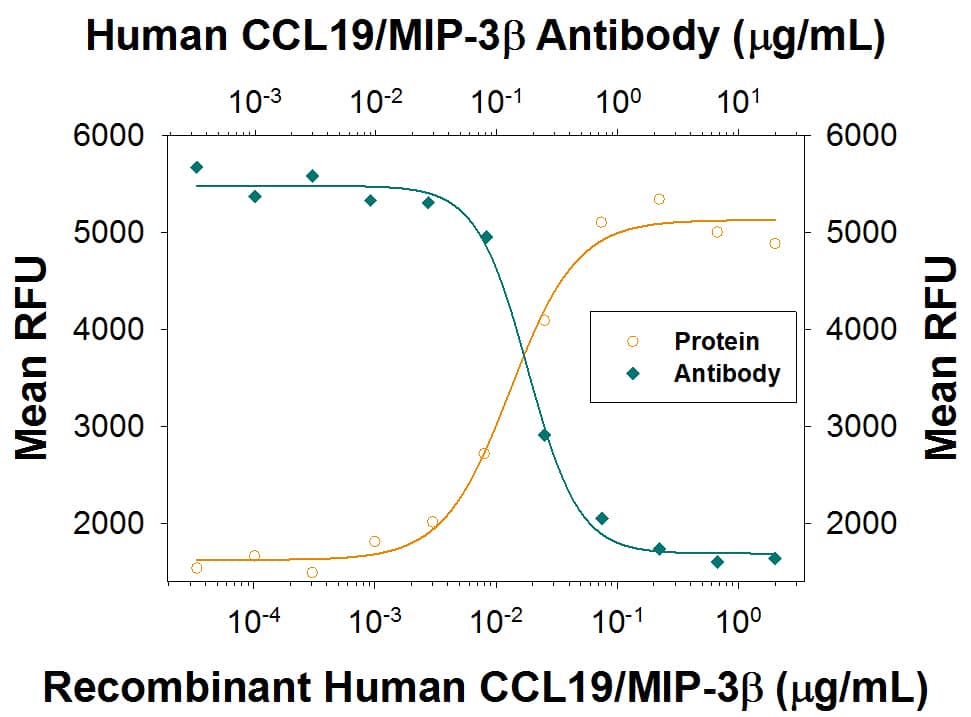Human CCL19/MIP-3 beta Antibody
R&D Systems, part of Bio-Techne | Catalog # MAB3611

Key Product Details
Species Reactivity
Applications
Label
Antibody Source
Product Specifications
Immunogen
Gly22-Ser98
Accession # Q99731
Specificity
Clonality
Host
Isotype
Endotoxin Level
Scientific Data Images for Human CCL19/MIP-3 beta Antibody
Chemotaxis Induced by CCL19/MIP-3 beta and Neutrali-zation by Human CCL19/MIP-3 beta Antibody.
Recombinant Human CCL19/MIP-3 beta (Catalog # 361-MI) chemoattracts the BaF3 mouse pro-B cell line transfected with human CCR7 in a dose-dependent manner (orange line). The amount of cells that migrated through to the lower chemotaxis chamber was measured by Resazurin (Catalog # AR002). Chemotaxis elicited by Recombinant Human CCL19/MIP-3 beta (50 ng/mL) is neutralized (green line) by increasing concentrations of Mouse Anti-Human CCL19/MIP-3 beta Monoclonal Antibody (Catalog # MAB3611). The ND50 is typically 0.1-0.5 µg/mL.Applications for Human CCL19/MIP-3 beta Antibody
Neutralization
Formulation, Preparation, and Storage
Purification
Reconstitution
Formulation
Shipping
Stability & Storage
- 12 months from date of receipt, -20 to -70 °C as supplied.
- 1 month, 2 to 8 °C under sterile conditions after reconstitution.
- 6 months, -20 to -70 °C under sterile conditions after reconstitution.
Background: CCL19/MIP-3 beta
MIP-3 beta, also known as ELC (EBI1-Ligand Chemokine), is one of many novel beta chemokines identified through bioinformatics. MIP-3 beta cDNA encodes a 98 amino acid (aa) residue precursor protein with a predicted 21 aa residue signal peptide that is cleaved to form the 77 aa residue mature secreted protein. MIP-3 beta is distantly related to other beta chemokines (20-30% aa sequence identity) and the gene for MIP-3 beta has been mapped to chromosome 9p13 rather than chromosome 17 where the genes for many human beta chemokines are clustered. MIP-3 beta has been shown to be constitutively expressed in various lymphoid tissues (including thymus, lymph nodes, appendix and spleen). The expression of MIP-3 beta is down-regulated by the anti-inflammatory cytokine IL-10. MIP-3 beta has been shown to be a unique functional ligand for CCR7 (previously referred to as the Epstein-Barr virus-induced gene 1 (EBI1) orphan receptor), a chemokine receptor that is expressed in various lymphoid tissues and activated B and T lymphocytes. EBI1 is strongly up-regulated in B cells infected with Epstein-Barr virus and T cells infected with herpesvirus 6 or 7.
Alternate Names
Gene Symbol
UniProt
Additional CCL19/MIP-3 beta Products
Product Documents for Human CCL19/MIP-3 beta Antibody
Product Specific Notices for Human CCL19/MIP-3 beta Antibody
For research use only
